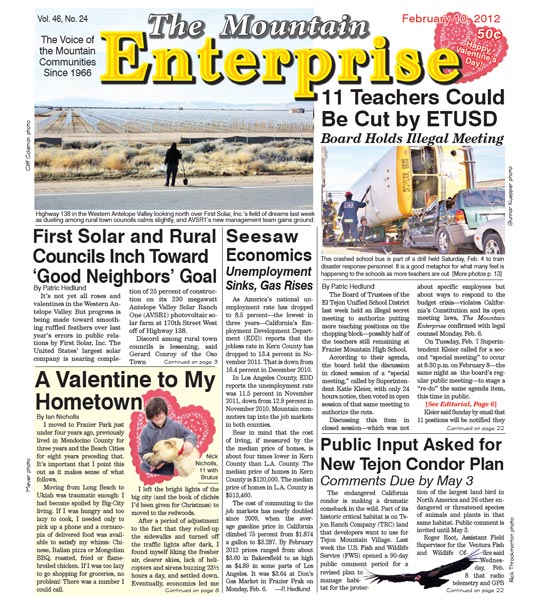El Tejon Unified School Superintendent Katie Kleier is still fairly new at her job. ETUSD Board President Paula Regan has served nine years as a trustee, but allowed an item to be discussed illegally in a closed session during a sudden “special meeting” on Wednesday, Feb. 1.
Item B on that agenda was “Reducing or Eliminating Certain Certificated Services for the 2012-2013 School Year.” [See story]
“That item cannot be talked about in closed session at all,” said California Newspaper Publishers’ Association General Counsel Jim Ewert, “They would be prohibited by the state constitution from trying to interpret the personnel exemption section to permit them to discuss the reduction or elimination of certificated services in closed session.”
The trustees had a duty last week to refuse to illegally bar the public from hearing deliberations of critical interest. What took place February 1 was a failure of duty by trustees and a violation of the law.
Then, suddenly, on February 7, ETUSD announced a February 8 special meeting of its board to discuss — in open session — what it had discussed in secret six days earlier.
How can coming back to “stage” a discussion in open session that was held in secret the week before remedy the violation?
Perhaps the district’s lawyer will say it technically may fix something from a legal standpoint, but the purpose of the law is to prevent secret discussions from taking place outside of the public’s view. Their secret discussion has already taken place—it cannot be undone.
If a legislative body wishes to hold secret discussions, do they merely have to hold an illegal meeting, discuss everything they don’t want the public to hear, then come back afterward and say “oops…we’ll do it again in an open meeting?”
Did they really not understand they were violating the law, or was it intentional? And does anyone believe they will honestly repeat the secret discussions they held during their illegal meeting, when they perform it again in public?
There is a provision in state law for a public agency to be required by the courts to audio-record all of its closed sessions, when that agency has been found to be in violation of sections 54956.7, 54956.8, 54956.9, 54956.95, 54957, or 54957.6 of California’s open meeting laws.
Under California law, very few matters are exempt from being discussed in open session. Scrupulous adherence to the law is essential to retain the public’s trust.
The Mountain Enterprise newspaper has sent a letter to the ETUSD Board of Trustees requesting that they pass a resolution at their next meeting, promising the public (whose trust they have violated) that they will not again attempt to discuss public matters in a closed session.
This is part of the February 10, 2012 online edition of The Mountain Enterprise.
Have an opinion on this matter? We'd like to hear from you.


